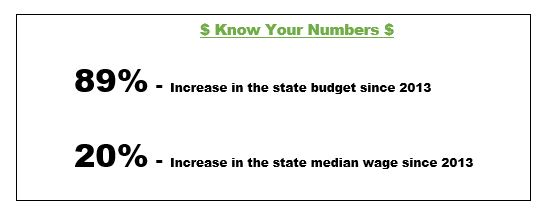What went right and wrong this legislative session
March 17, 2022
The 2022 legislative session ended on March 10 with a mixed bag that included some menial public safety reforms, unsustainable state spending, and homelessness policies that at best scratch the surface of the problem.
Public Safety
We began the session imploring lawmakers to fix a “police reform” law that effectively defanged police responses to actual or suspected criminal activity.
Senate Minority Leader John Braun described the results this session as “improvements but not complete fixes. We didn’t get everything.”
The bills that did pass this session included HB 1735, which expands and clarifies a police officer’s use of force, while and HB 2037 restored most of an officer’s ability to pursue suspects based on “reasonable” suspicion, rather than “probable cause.” However, a bill that would also allowed officers to engage in vehicular pursuits failed to clear the legislature despite passing in both chambers due to hostility from key-ranking legislators.
In fact, a vocal and active anti-police presence within the majority party made it tremendously difficult to get the bills that did pass enacted, and without watering down the language.
“It was a fight at every stage,” Braun said.
Those same criminal coddlers sponsored bills that would have severely undermined public safety throughout Washington. Thankfully, some of them didn’t pass per pressure from groups like Change Washington, such as a proposal to reduce sentences for murderers who kill via drive-by-shootings.
However, they almost passed a bill sponsored by Sen. Manka Dhingra that would have allowed murderers, rapists, and sex offenders sentenced to life in prison like Gary Ridgeway the ability to petition for parole. Under that bill, the presumption was that the criminal should be paroled unless proven otherwise.
Meanwhile, the legislature ignored bills that would have helped both residents and small businesses, including:
- Strengthened definition of theft to help retailers crack down on in-store larceny
- Increased funding to hire and train more law enforcement officers
- Harsher sentences for catalytic converter thefts
Although some fixes were made to public safety, much more work is needed. Based on the effort necessary to pass what little was accomplished this year and the opposition from key-ranking legislators, it’s clear a shakeup is needed in Olympia.
Government Spending
In 2013 the median income in Washington state was $64,203. By 2021, it had increased by 20 percent to $76,687.
Compare that to the state’s operating budget. In 2013-15 it was $33.9 billion. With the passage of the 2022 supplemental budget, spending is now a whopping $64 billion per biennium.
That’s an 89 percent increase in state spending in less than a decade.

If you’re the typical Washington resident, your salary has not almost doubled in the past ten years. When you’ve wanted to buy things you want, you’ve had to exercise fiscal restraint by not spending beyond your means. This applies more so for people living off pensions or fixed incomes.
In other words, the increased tax burden and unprecedented spending has not only failed but resulted in decreased quality within public education.
The legislature should learn from this experience: you don’t solve a problem simply by throwing more money at it.
What’s worse is that the 2022 supplement budget includes a $5 billion spending increase with no meaningful tax cuts despite an astounding $15 billion in surplus revenue expected over the next four years. SB 5932 would have reduced the state sales tax by one percent, from 6.5 percent to 5.5 percent. However, the legislature rejected it. As Jason Mercier at the Washington Policy Center has noted, the last time the legislature reduced the sales tax was 1982 – 40 years ago.
Meanwhile, the state anticipates “personal income growth will be weak this year as the extraordinary stimulus of the last two years is withdrawn.”
At a time of record-high inflation, increased costs of basic commodities, and several years of economic uncertainty, Washington residents deserved tax relief now more than ever.
Homelessness
Prior to the legislative session Governor Jay Inslee proposed $800 million in spending on homelessness, including the creation of a new Office of Intergovernmental Coordination on Public Right-of-Way Homeless Encampments. Though the Senate approved the new office creation, it failed to clear the House. However, legislators voted in favor of spending $500 million in the capital budget for housing and shelters and $200 million in the supplement budget for outreach services.
The legislature also enacted HB 1866, which establishes a new state program to provide permanent housing and services support for homeless people who qualify.
Before the state spends another dime addressing homelessness, it needs to acknowledge the role mental illness and substance addiction play. Simply giving the homeless housing, temporary or not, won’t fix what got them on the street in the first place. Earlier this month a homeless man died of a drug overdose in a Seattle tiny village operated by a nonprofit program that allows drug use within the village.
Radio host Jason Rantz argues that “this program, along with state laws that made it nearly impossible for parents to get their teens treated for addiction, helped lead to Jeremy’s early death.”
We don’t need more spending, but better spending on services that attack the root cause of homelessness in our state, along eliminating or revising any laws that prevent appropriate treatment for the mentally ill or addicts. Lawmakers will never fix the homelessness crisis if they continue to merely bail water from a leaky ship.
Up next: If you think gas prices are bad now, wait until you hear what the state legislature did to make them even worse….




